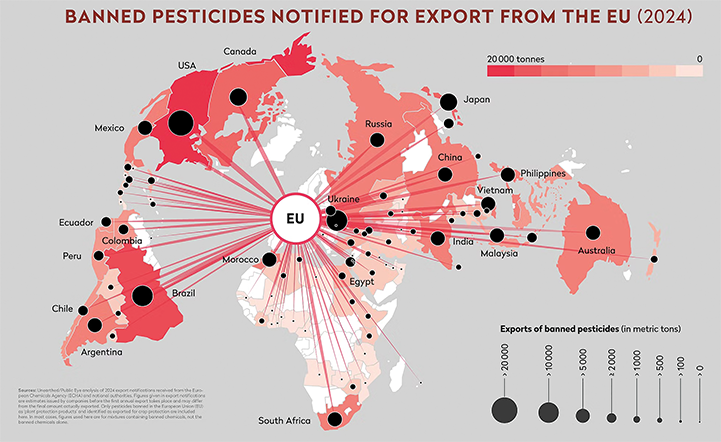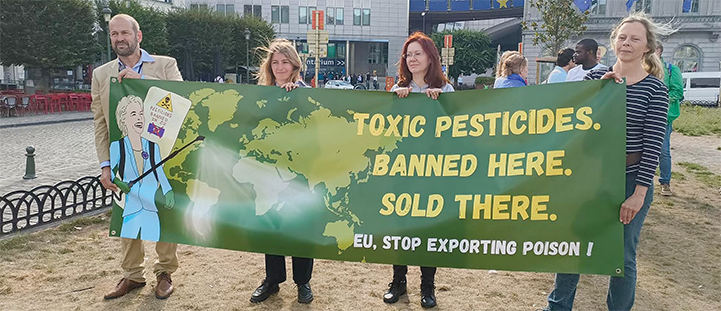PROBE: European Union doubles shipments to SA of ‘highly hazardous’ pesticides banned in Europe – despite their link to the death of 23 kids and poisoning of 900 others last year…
By Monk Nkomo
South Africa has been flagged as one of the two major African countries importing 9000 tons a year of hazardous pesticides banned in Europe.

This revelation has been described by Swiss lobby group Public Eye and Unearthed, which conducted an investigation into the malpractice, as “a blatant and racist decision” allegedly driven by the European Union (EU) to undermine the health of communities in low – and middle- income countries.
According to the report, the EU exported nearly 122 000 tons of banned pesticides last year despite a commitment by the European Commission to put an end to this practice in October 2020. This was a 50 percent increase compared to the 81 000 tons notified in 2018.
Investigations also revealed that nearly 9000 tons of banned pesticides had been exported to Africa, with South Africa and Morocco the top importers. Brazil has been listed as one of the destinations for these pesticides “made in Germany’’.
The Public Eye report noted that the EU-banned pesticide exports were destined to 93 different countries last year. A total 75 percent of these were low-and middle-income countries where negotiations were weaker and despite a United Nations agencies warning of the use of highly hazardous pesticides posing greater risks.
This development flies in the face of SA government proclaimed concerns over poisonous pesticides last year – voiced in the wake of 23 children having died and nearly 900 people were sickened from pesticide poisoning. The death toll included six young children after eating contaminated snacks in Naledi, Soweto. The incidence was traced to small amounts of highly neurotoxic pesticides, including the insecticides terbufos and aldicarb, found in local food items.
Early this year, scores of Western Cape farm workers testified how they were forced to work with poisonous pesticides banned in Europe and other countries in the Southern African Development Community (SADC) region. The hearings were initiated by the SA People’s Tribunal on AgroToxins. Approached for comment, the Department of Agriculture’s communications head, Moses Randitsheni, had not responded to Weekly SA Mirror inquiry by late today.
The Africa Centre for Biodiversity (ACB) said in a statement it was “appalled by both the increase in the export of pesticides banned in Europe to developing countries” and the broken promises made by the EU Commission.
‘’It epitomises the environmental racism inherent in this project, as well as bringing into sharp relief, the power that agribusiness giants such as BASF and BAYER wield in the EU,’’ ACB executive director Mariam Mayet said.
“This situation is intolerable and the urgency for the EU to desist from exporting restricted or banned pesticides cannot be overstated’’.
Kara Mackay, campaign coordinator for the SA grassroots group Women on Farms Project, condemned the continuing exportation of pesticides especially to poor countries, adding: “The practice puts profit before people, and we, in South Africa, are demanding a change. We are sick of it and literally sick from it. This was a blatant, obvious double standard which reveals a racist and colonial thinking that Europe still suffers from.
‘’ Sending banned pesticides to Africa or any other low-income country is only possible if you see people that use these pesticides as inferior and therefore you do not have to care for their health.’’
A spokesperson for the European Commission said they shared the concerns regarding the exports to third countries of EU-banned pesticides and assured that they were committed to addressing this important issue.
‘‘An impact assessment was launched in 2023 and the Commission is currently evaluating possible options to implement its initiative and ensure that the most hazardous chemicals banned in the EU cannot be produced for export’’.
In South Africa, tens of thousands of farmworkers are put at risk annually when they are exposed to highly toxic pesticides, including the carbamate insecticide aldicarb, often without proper personal protective equipment, according to lobby group Beyond Pesticides.
In response, a partnership between the Women on Farms Project and Oxfam (in South Africa and Germany) launched a “Double Standards Pesticides” campaign in 2019 to pressure SA authorities to ban 67 pesticides already banned in the European Union.
Meanwhile, Syngenta, a global agricultural technology company that develops crop protection and seeds, which has been acquired by Sinochem, a Chinese state-owned company that is now part of ChemChina, continued to ship thousands of tons of paraquat, a notorious weed killer implicated in tens of thousands of poisoning cases around the world.
The Public Eye report also showed that a total 75 pesticides banned to protect human health and the environment, had been notified for export from the EU in 2024. That is almost double the 41 pesticides exported in 2018.
Marcos Orellana, the United Nations Special Rapporteur on Toxics and Human Rights, deplored, for its part, ‘’ odious double standard’’ that represented a form of modern-day exploitation whose racialised undertones could not be ignored.
‘’It seems that for countries that produce and export pesticides, the life and health of people in recipient countries is not important as their own citizens. While workers and their families suffer, pesticide manufacturers profit.’’
The new investigation by Public Eye and Unearthed revealed that the EU trade in banned pesticides had expanded dramatically despite European Commission promises to end the trade. In 2024, EU countries approved the export of almost 122 000 tons of pesticides whose use was banned on their own farms because of the dangers they posed to human health and the environment.
‘’ Next on the list come the weed killer, glufosinate, manufactured by German chemicals giant, BASF, which was banned in 2018 after it was classified as toxic to reproduction and an endocrine disruptor.’’
According to the report, the EU also continued to export thousands of neonicotinoids, the bee-killing insecticides involved in the decline of pollinators around the world. Their use in European fields has been banned since 2019 because of “unacceptable’’ risks to the bees.
At a demonstration in Brussels at the end of June, a coalition of more than 600 NGOs and trade unions, of which Public Eye is a part, called on the President of the Commission Ursula von der Leyen to keep her promise by finally putting an end to the exports of banned pesticides from European soil.
The NGOs criticised the Commission’s inaction and its “double standards”, which undermined the EU’s credibility and global leadership in the protection against hazardous chemicals. It also posed “an unacceptable risk” to communities in low- and middle-income countries.

































